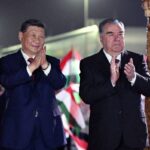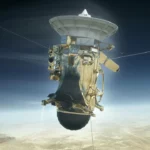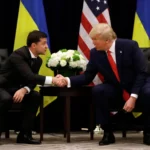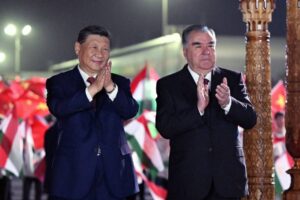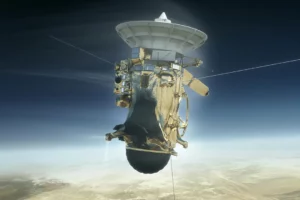While Russia’s war in Ukraine remains at the forefront of international attention as the most severe geopolitical crisis in the world today, the decade-old, internationalized conflict in Syria may still have new surprises to offer. As the threat of a new Turkish military incursion into northern Syria looms, other international stakeholders in the Syrian crisis continue to voice their concerns over Ankara’s ambitions. At odds with Turkey since 2011 over its desire to overthrow the regime of Syrian President Bashar al-Assad and its support for an array of armed opposition factions, Iran has been increasingly vocal of late in opposing a potential new Turkish military operation.
When asked about Turkey’s military activities in northern Syria and Iraq, Iranian Foreign Ministry Spokesman Saeed Khatibzadeh said on June 20 that, “The Syria file is a matter of dispute between us and Turkey.” According to him, in “detailed bilateral meetings” with the Turkish side, Iran has made it clear that its “main and clear goal” is to preserve Syria’s territorial integrity. In the same vein, Ali Asghar Khaji, a senior Iranian diplomat who headed Iran’s delegation at the 18th round of the Astana talks on Syria, said at a meeting with the Turkish delegation on June 16 that, “Syria’s territorial integrity and sovereignty are untouchable.” Most recently, during his visit to Ankara on June 27, Foreign Minister Hossein Amirabdollahian said that although “Iran understands Turkey’s security concerns” in Syria, such concerns should be addressed through “dialogue and peaceful means.”
Meanwhile, in preparation for a potential Turkish incursion, Iran has reportedly sought to facilitate coordination between its allied forces in Syria, units of the Syrian army, and Kurdish militias in northern Syria. These diplomatic and military developments have sparked speculation about the possibility of tensions or even confrontation between Turkish and Iranian forces in Syria. In fact, during the most recent round of Turkish military operations in northern Syria in early 2020, the two sides came to the brink of a confrontation. Although a military face-off was eventually averted — primarily thanks to Russia’s role in reaching a cease-fire deal with Turkey — there is no guarantee of a repeat. A series of recent developments in Syria and beyond has increased Tehran’s threat perception of Ankara and may trigger a military reaction, albeit an indirect one, to a new Turkish operation.
Iran’s concerns in Syria
Since the beginning of the Syrian conflict, Turkey has conducted four major military operations in northern Syria. The first operation, Euphrates Shield, was carried out in northern Aleppo in August 2016, during which Turkish-backed forces took control of 2,055 square kilometers of that area. Operation Olive Branch in January 2018 allowed Turkey to capture the entire Afrin District. In late 2019, Operation Peace Spring expanded the areas under the control of Turkish and allied forces east of the Euphrates. A subsequent operation in the northwestern governorate of Idlib in February 2020, known as Spring Shield, further strengthened Turkey’s hold over Syria’s northern strip.
Turkish officials have continuously stated that the purpose of their military operations is to counter the “terrorist threat” in northern Syria, emphasizing particularly the urgent need to confront the Kurdish militias of the People’s Protection Units (YPG). To Ankara, the YPG is the Syrian offshoot of the outlawed Kurdistan Workers’ Party (PKK), which has been fighting with the Turkish government for decades. But, as a result of those operations, Turkey and its affiliated forces are now in control of about 10% of Syrian territory. Now, Turkish officials, including President Recep Tayyip Erdoğan, insist that an increase in terrorist threats stemming from Syria has necessitated a new operation. According to Turkish officials, the purpose of the operation is to create a 30 kilometer deep “safe zone” on Syrian soil, in order to purge the “terrorists” and pave the way for the repatriation of more than 1 million Syrian refugees. So far at least two cities, Manbij and Tel Rifaat, have been cited as primary targets of Turkey’s forthcoming military operation, yet there has also been speculation that Kobani and Ayn Issa could be involved as well.
Manbij and Kobani, as well as almost all areas east of the Euphrates, have been outside Iran’s zone of influence and interest in Syria. As a result, a Turkish operation in those areas will not provoke a reaction from Iran, as it has not in the past. In fact, Kurdish militias east of the Euphrates, acting under the banner of the Syrian Democratic Forces (SDF), are considered allies of the United States in Syria. From this perspective, any move by Turkey that would potentially limit the geographical scope of U.S. influence in Syria would be welcomed by Iran. But when it comes to Tel Rifaat, things look quite different.
Located in the north of Aleppo Governorate, Tel Rifaat is now besieged by Turkey (and its local proxies) from the north, east, and west. But south of Tel Rifaat is where the two Shiite towns of Nubl and al-Zahra are located; these settlements are situated between Tel Rifaat and Aleppo city. Thus, the region is vital to Iran and its allies in Syria, both ideologically and strategically. From an ideological point of view, Iran is concerned that the next step for Ankara-backed Sunni militias after taking control of Tel Rifaat would be to target the Shiites of Nubl and al-Zahra. Strategically, Tehran believes that taking control of Tel Rifaat would be a prelude to Turkey and its allies marching toward Aleppo city. Since the Syrian army recaptured Aleppo in 2016, the city has seen a considerable increase in the influence of Iran and its affiliated groups. From a broader perspective, there is a concern in Iran that if Ankara succeeds in establishing its long-desired 30-kilometer safe zone, it will launch a new push to overthrow the Assad regime. Iran’s Strategic Council on Foreign Relations (SCFR) argues in an analysis that, “Turkey seeks to increase pressure on the Assad government and pave the way for a change in central and southern Syria,” which runs counter to Iran’s interests in those areas.
Considerations beyond Syria
Apart from the potential geographical scope of Turkey’s new operation, there are other factors making Tehran more concerned than ever about Ankara’s plans in Syria. These factors are primarily related to recent trends in Turkish foreign and regional policy, with the Turkish-Israeli rapprochement at the top of the list. The SCFR warns that, “Supporting anti-Assad forces is a joint Turkish-Israeli project, which was agreed upon during [Turkish Foreign Minister] Cavusoglu’s recent visit to Tel Aviv.” It also argues that the “project” will be implemented if Turkey’s primary goal of “completing the security corridor in northern Syria” is met. In the same vein, the semi-official ILNA news agency quotes Ahmad Bakhshayesh Ardestani, a former member of Iran’s parliament, as saying that, “Israel is investing in Turkey’s influence in Syria.” Israel’s goal, according to him, is to create instability in Syria to keep Tehran busy.
In fact, Iranian leaders have good reason to believe that Turkey and Israel are forming a common front against Iran. On June 23, shortly before then Israeli Foreign Minister Yair Lapid visited Turkey, it was announced that Turkish security forces had foiled an Iranian plot to assassinate Israeli tourists, an accusation that Iran dismissed as “ridiculous.” What strengthens Iran’s suspicion of an anti-Iranian agenda in Ankara’s foreign policy is that Turkey has also been developing relations with Iran’s other regional rivals, including Saudi Arabia. Saudi Crown Prince Mohammed bin Salman’s visit to Turkey on June 22 received widespread attention in Iran. One of Iran’s concerns is that Turkey’s quest for Saudi investment to improve its ailing economy could lead Ankara to reconsider its ties with Tehran in order to please Riyadh. Additionally, the potential for a more active Turkish role in Yemen against the Iran-backed Houthis is particularly worrying for Tehran.
Turkey’s evolving role in Iraq is another issue that has negatively affected Iran’s view of Turkey. Turkish military intervention in northern Iraq, aimed at countering the threat of Kurdish insurgency, is nothing new. But over the past two years, Turkey’s role has taken on new dimensions that are of concern to Iran. The 2020 trilateral agreement between Ankara, Baghdad, and the Kurdistan Regional Government (KRG) in Erbil to purge the PKK in Sinjar was a milestone in that regard, as Iran felt effectively excluded from security arrangements in northern Iraq. Since then, pro-Iran Shiite groups have repeatedly accused Turkey of meddling in Iraq, warning that they might take military action against Turkish forces. Turkey’s efforts to increase its influence among Iraq’s Kurdish and Sunni political factions, especially after the November 2021 parliamentary elections, have made Iran fearful of reducing its traditional influence in Iraqi politics.
As such, many in Iran have come to believe that the Turkish leader’s proclaimed goal of “fighting terrorism” is simply an excuse to pursue an expansionist policy in the Middle East and beyond, which will ultimately lead to Turkey’s alignment with Iran’s enemies and further exacerbate the conflicts of interest between Tehran and Ankara. Ali Akbar Farazi, a veteran diplomat who has served as Iran’s ambassador to Romania, Hungary, and Cyprus, believes that Turkey has defined a “regional and global political and diplomatic sphere of influence” for itself in the context of its “neo-Ottoman” approach. Therefore, Turkey’s military involvement in Syria and Iraq is aimed at realizing this sphere of influence. According to Farazi, “The possibility of a conflict between the Turkish army and the Syrian army is very serious, and as a result, a confrontation between Iranian and Turkish forces could also occur.”
Should we expect an Iran-Turkey conflict in Syria?
Given the accumulation of disputes and strengthening of tensions between Tehran and Ankara in recent years, Farazi’s concern about the possibility of a conflict between Iran and Turkey in Syria is not entirely unfounded. That said, Tehran has good reason to avoid a confrontation with Ankara. On the one hand, even a limited direct military reaction from Iran in Syria could increase tensions in bilateral relations to an unprecedented level, pushing Ankara further toward alignment with Israel and Saudi Arabia. The last thing Iran wants to see is a solidified anti-Iran front in the Middle East comprising all of its main regional rivals. On the other hand, such a move would likely lead to the collapse of the Astana process. Indeed, the Astana track has largely lost its practical function over the past two years, turning into a symbolic format. However, the mere symbolic function is quite crucial for Tehran, as it’s the only international diplomatic framework in which the nation has had an active role. In this sense, Iran has viewed the Astana process as a means of legitimizing its involvement in Syria.
Considering these risks and limitations, Iran has already embarked on a set of political and military moves in Syria, albeit indirectly, to counter the threat of a new Turkish operation. On the political level, Iran hopes to push the Kurds toward an agreement with Damascus that would entail the Kurdish militants handing over control of Tel Rifaat to the Syrian army before a Turkish incursion takes place. This would deprive Ankara of its chief excuse for including Tel Rifaat in its new Syria operation, i.e., to fight against the Kurdish insurgency. At the same time, Iran has sought to persuade Russia, which appears to be less interested in active military involvement in Syria due to its preoccupation with the Ukraine war, to play a more active role in deterring Turkey from a large-scale operation. Iran’s semi-official Mehr News Agency mentions this aspect of the Iranian approach, suggesting that, “If the Kurds agree to cooperate with the Syrian and Iranian armies, at least in Tel Rifaat, in such a way as to gain their support or attract more Russian attention, the calculations of the Turkish army will change to some extent.” In that case, Iran could actually kill two birds with one stone, i.e. prevent a Turkish attack on Tel Rifaat while — perhaps more importantly — using the SDF’s vulnerability against Turkey as a tool to weaken U.S. influence in Syria. In other words, when it comes to the Syrian Kurds, Iran’s considerations go beyond the role of Turkey and have more do with how to undermine the alliance between the Kurdish militias and Washington.
Iranian efforts in such a direction in alignment with the Assad regime have already borne some fruit. On the one hand, the SDF announced in a statement on June 7 that its forces are ready “to coordinate with forces of the Damascus government to confront any possible Turkish incursion and to protect Syrian territories against the occupation.” Although this is still far from Iran’s desired goal of Tel Rifaat being handed over to the Syrian army, it could be seen as a step forward. On the other hand, it seems that Russia, after initial hesitation, has decided to take a stricter stance against Turkey’s plans for northern Syria. On June 15, ahead of the latest Astana meeting in Kazakhstan, Russia’s special presidential envoy for Syria, Alexander Lavrentiev, called a potential new Turkish operation “illogical and irrational” while also dismissing any possible “bargain” with Ankara regarding Syria. The remarks came a few days after Russian forces conducted aerial patrols around Tel Rifaat to consolidate their positions in the area.
But should all these moves fail to deter Turkey, Iran has also worked on military plans to confront Turkish forces or at least limit the scope of their operation. These plans include promoting and facilitating cooperation between Iran-backed militias in Syria and Kurdish militants, as well as sending reinforcements to these groups. Since early June, the Iranians have reportedly dispatched militia forces to Nubl and al-Zahra. The forces have been deployed to frontlines with Turkish forces and the Turkish-backed Syrian National Army in northern Aleppo and areas around Afrin. At the same time, there have been reports that Iran has established a joint operations room north of Aleppo consisting of its Syrian and non-Syrian proxies, YPG forces, and Lebanese Hezbollah. If true, this would be the most comprehensive military coordination between Iran-backed forces and Kurdish militias since the start of the Syrian conflict.
As such, if Turkey decides to carry out its plan to attack northern Syria, and if the operation extends to Tel Rifaat and northern Aleppo, Iran will most probably resort to an indirect military response via proxy forces. Although this would be a less risky option compared to the scenario of a direct Iranian-Turkish confrontation, there would still be a high likelihood that the situation could spiral out of control and lead to a broader and longer-term conflict between the two neighbors.
Source : MEI

